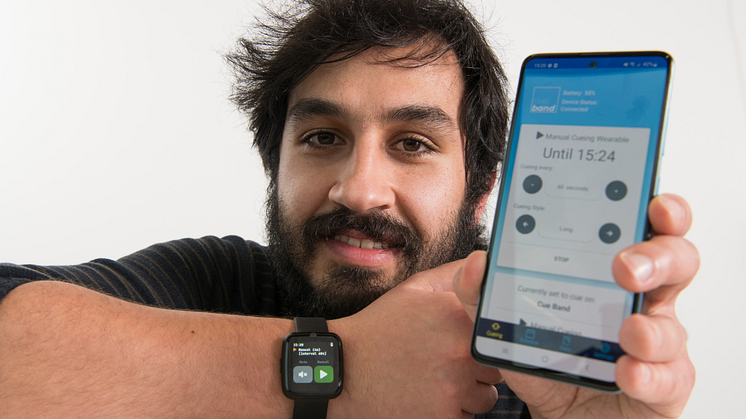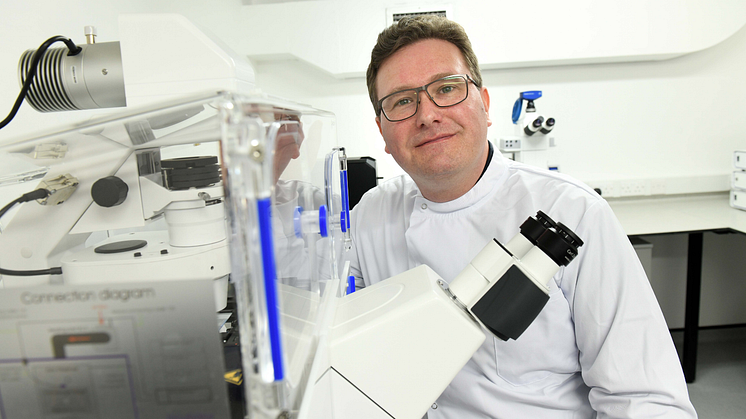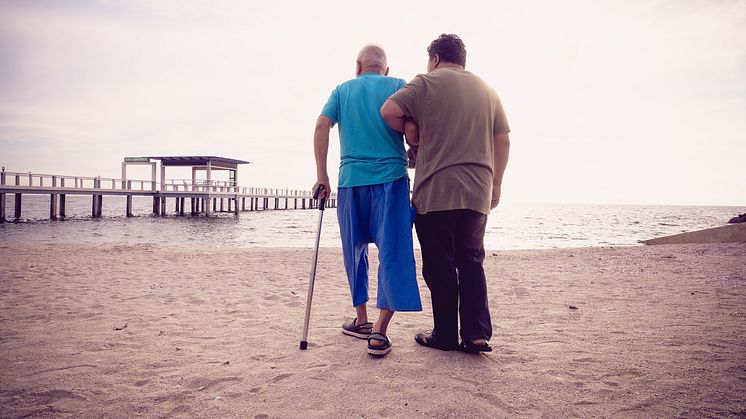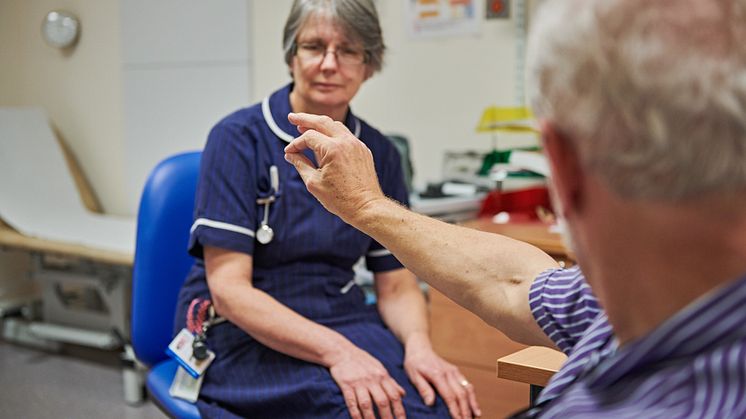
Press release -
Wearable device provides support for Parkinson’s patients
A team of researchers have received funding from Parkinson’s UK to create a device which tackles one of the symptoms of Parkinson’s disease.
The part of the brain which prompts the automatic swallowing response can be impacted by Parkinson’s Disease, meaning patients can experience a pooling of saliva which can result in drooling or even choking.
In response, academics from Northumbria University, Newcastle University and the University of Lisbon have developed the Cue Band – a wearable wristband device which delivers a vibration ‘cue’, prompting the patient to swallow without the need for medical intervention.
The research has been led by Associate Professor Dr Kyle Montague and Senior Research Assistant Luís Carvalho of Northumbria University’s Department of Computer and Information Sciences, and funded by the charity Parkinson’s UK.
The research team are now looking for Parkinson’s patients to take part in a trial of the device. They are aiming to recruit up to 3,000 people who will be provided with a free Cue Band and given advice on how to use it.
As Dr Montague explains: “Cue Band is all about improving the quality of life for people living with Parkinson’s Disease but without the need for further medication, which can often have unpleasant side effects.
“The device is worn on the wrist like a smart watch and connected to a smartphone app; allowing it to be pre-programmed to vibrate at scheduled times to prompt the patient to swallow."
Luís Carvalho added: “The prompting intervals and frequency of the cues can be easily adjusted and the smartphone app allows patients to also record their symptoms so they can monitor any changes in their symptoms.
“The device is capable of recording other data, including monitoring heartrate and sleep patterns, giving us a great overall picture of a patient’s health.”
Until now the common treatment for drooling, the medical term for which is Sialorrhoea, has been to provide an injection to stop saliva production, but this can have an impact on oral health, causing discomfort and a dry mouth.
The Cue Band can be produced for around £30 per device, making it a low-cost, non-medical treatment option.
The operating system running on the Cue Band is bespoke and can be updated easily. It is completely reprogrammable via the connected smartphone device, meaning there is potential for it be used by people affected by other illnesses or diseases, who would benefit from the ‘cue’ technology.
Working alongside Dr Montague on the Cue Band project is Professor Richard Walker, of Northumbria Healthcare NHS Foundation Trust.
Speaking about the trial he said: “Drooling is a major problem for people with Parkinson’s and can be very embarrassing, potentially restricting their social life.
“This discreet technology could make a major difference and we are keen the people with Parkinson’s themselves will help us drive the research forward.”
The Cue Band project has been funded by Parkinson’s UK. The charity’s Associate Director of Research, David Dexter, said: “Novel technologies have the potential of delivering improvements in quality of life for the 145,000 people with Parkinson's in the UK in a shorter time frame than developing new drugs, which can take decades.
“As such Parkinson's UK launched its non-drug approaches grant scheme three years ago. We were excited to fund the Cue Band trial being run by Dr Montague, particularly since this cheap device tackles drooling which is a major problem in Parkinson's. We look forward to results from this clinical study.”
The Cue Band trial is open for new patients until 30 April 2023. Dr Montague and the research team will carry out a comparison study between patients receiving prompts for swallowing from a smartphone app and the Cue Band.
Participants will experience both cueing methods at determined intervals for three weeks and register their symptoms and experiences each day throughout the study.
If you are a Parkinson’s patient who would like to take part or know of a patient who may benefit from the trial, please download the Cue Band app, and join the study.
Topics
Categories
UNIVERSITY OF THE YEAR 2022 (Times Higher Education Awards)
Northumbria is a research-intensive modern university with a global reputation for academic excellence. Find out more about us at www.northumbria.ac.uk
--- Please contact media.communications@northumbria.ac.uk with any media enquiries or interview requests ---













